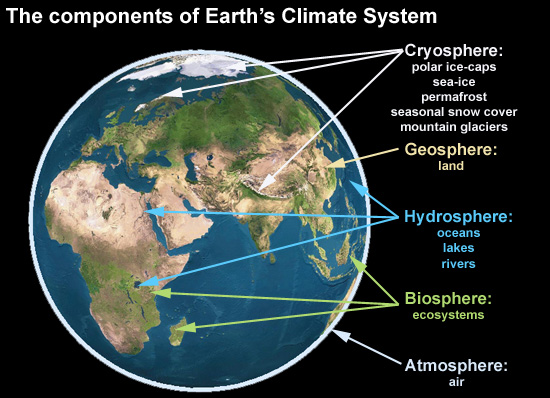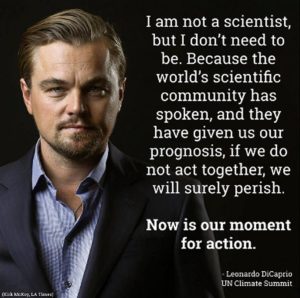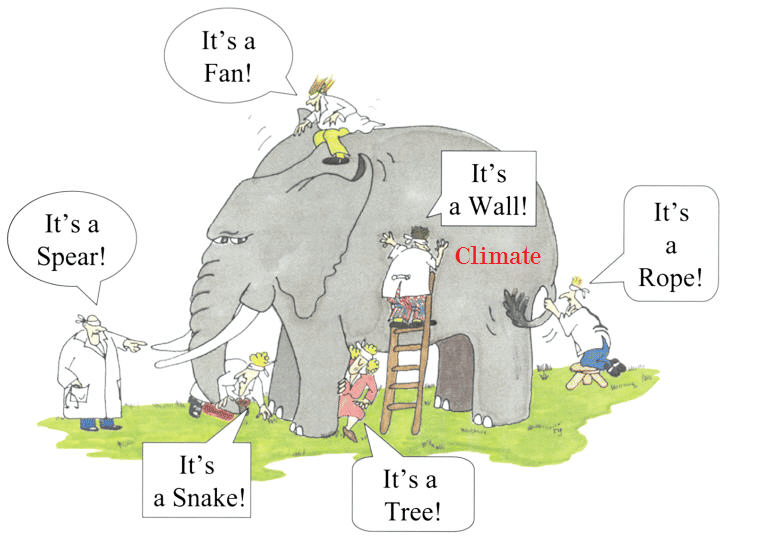
Here is a fine exposition of Bob Carter’s thoughts on the field of climate science and why we should not jump to conclusions concerning global warming/climate change. The text and some illustrations are provided by Russ Swan in his post (here). I added one at the end.
Have you ever wondered about these people when they are so definite about mankind causing climate change? Have you ever wondered how much of the information is from their own expertise and how much is what they’ve learned from someone else? Are they really passing on real proven scientific facts or just what they believe to be true from information provided by someone else?
Or do you just accept what they are telling you?
The average person on the street might be forgiven for thinking that climate change scientists are primarily meteorologists or climatologists plus perhaps some others with supporting expertise. But that would be only partially right.
The subjects relating to climate change actually diverge into more than 100 scientific sub-disciplines, the elements of which can be exceptionally intricate, highly complicated and intertwined. Just changing one of the many data inputs e.g. the output chemistry of sub-sea volcanoes to a climate change puzzle can flow-on to incorrect or at least misleading changes in the final solution. And the answer will still be a “best probable” result – not fact.
At most there may be a handful of scientists that have mastery of two or three scientific disciplines such as Professor Robert M. Carter (decd) who was a qualified palaeontogist, stratigrapher and marine geologist. Yet even if a scientist does have expertise in two or more of the climate change elements, he/she still needs to find and use data from other sources to cover the gaps in his/her own knowledge. Such data may in turn only be a “best probable” solution as opposed to fact(s) as will be explained further below.

No Such Thing as a Climate Expert
It must therefore be obvious that there can be no such thing as an “expert” simply because no one can fully comprehend the entirety of it all.
This doesn’t stop the media, in particular the TV media in regularly presenting interviewees as experts to lend credibility to their show. But anyone who claims or admits to being an expert in climate change is either kidding themselves, egocentric or is being deceitful.
The bottom line is that when a supposed expert fronts up in the media – watch it guardedly or else switch the channel. At the end of the day everyone, including the scientists themselves are basically amateurs when a topic is outside their own field of expertise – even if they are an educated amateur.
But having someone with at least some scientific background involved in climate change discussions has got to be far more preferable than pulling celebrities into the debate. These people despite their best intentions, are simply promoting their own views and muddying the waters for the public to make a realistic conclusion in their own minds.

Conclusion
Apart from that all three groups of scientists generally DO agree that the Earth’s climate has always changed, that human emissions affect local climates e.g. urban areas and have a summed potential to affect climate globally, and that carbon dioxide is a mild greenhouse house – note the word “mild”.
The real argument then is not about whether the Earth is heating up, but about how relevant is AGW when considered against natural climate change processes.
The Blind Men and the Elephant (Indian Fable)

Footnote: For more on science as knowledge rather than opinion see Yellow Climate Journalism
“In sum, a strategy must recognise what is possible. In climate research and modelling, we should recognise that we are dealing with a coupled non-linear chaotic system, and therefore that the long-term prediction of future climate states is not possible.”
So stated the IPCC’s Working Group I: The Scientific Basis, Third Assessment Report (TAR), Chapter 14 (final para., 14.2.2.2), p774.
So “climate science” has about as much predictive capability as the study of black cock entrails.
Yep, sounds about right…
LikeLike
I also am not a scientist, nor do I need to be. The worlds scientific community predicts I will die. Probably of old age.
LikeLike
And that’s fact, not an opinion.
LikeLike
Predictions of the death of Arctic Ice, not a fact, only opinion.
LikeLike
I would like to tell you of my latest book, “Human Caused Global Warming”.
‘The Biggest Deception in History’.
Available on ‘Amazon.ca’.
http://www.drtimball.com
LikeLike
Reblogged this on Climate Collections.
LikeLike
Being grateful for for your post. I know that within today’s complicated world, folks have many beliefs and this has made it to be really hard for learners just like me. However, you have made the idea very easy for me to comprehend and I now know the correct thing. Your continued reputation among the top experts with this topic may be enhanced through words of appreciation from followers like me. Thanks, once more.
LikeLike
Thanks for the kind words, citpoliraka. Please don’t call me an expert, because I am a layman with a scientific background, and curious enough to investigate the studies behind alarmist claims. The fact is, our knowledge of the climate system is inadequate to predict its behavior, as many posts here describe.
LikeLike